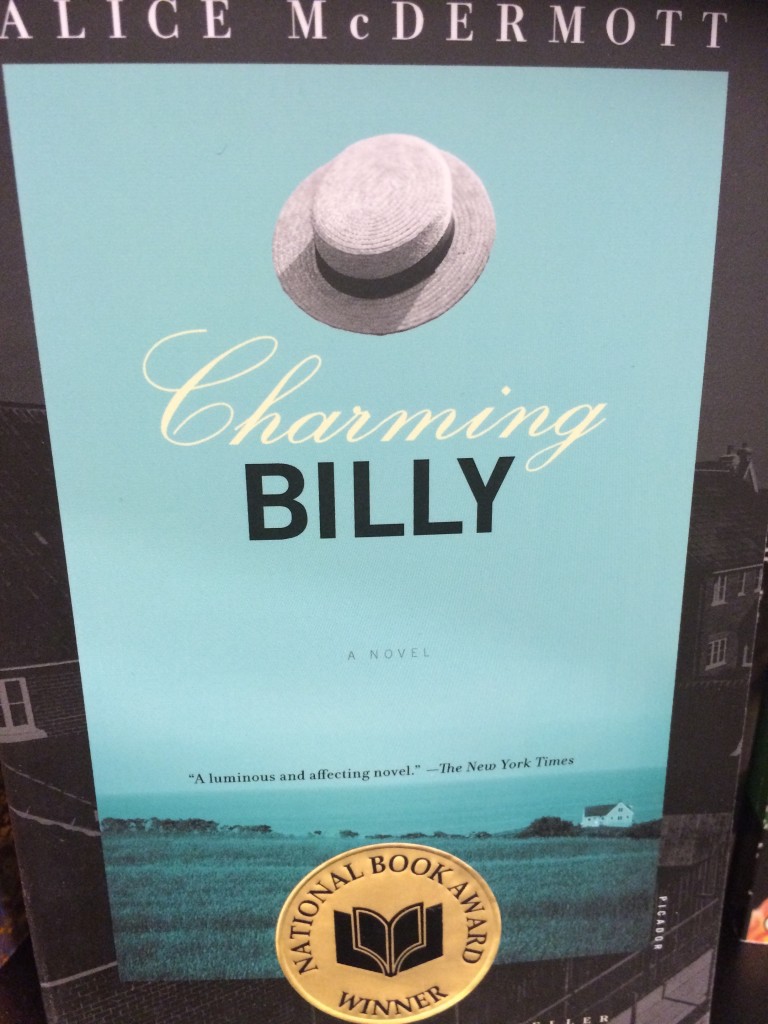 In celebration of St. Patrick’s Day 2015, ATG is exploring “All Things Irish.” Below is a book review of the Irish American novel Charming Billy by Alice McDermott.
In celebration of St. Patrick’s Day 2015, ATG is exploring “All Things Irish.” Below is a book review of the Irish American novel Charming Billy by Alice McDermott.
Alcoholism. Loyalty. Generosity. Poverty. Catholicism. Redemption. And love. These are the central themes running through Alice McDermott’s award-winning Irish American novel, Charming Billy (1998), which tells the story of the life and trials of one Billy Lynch – an enigmatic Irish American man from Queens, NY who seemingly succumbed to alcoholism after “losing” the love of his life.
Full of insight into the culture, values and struggles of Irish Americans, McDermott also offers glimpses into the stereotypes associated with the Irish, such as references to “Paddy,” Irish policemen, and the song “Danny Boy”*, while sprinkling episodes of humor throughout, giving this novel a distinctly Irish American feel.
As one might expect of such a novel, faith and Catholicism – and the subsequent guilt that is so characteristic among Irish Catholics – play a prominent role as the story unfolds. “I was certain I was going to hell…”, says Billy’s love interest, Eva, during their childhood. “…don’t all children think they’re going to hell?”
McDermott also provides insight into the rituals of Catholicism when she talks about midnight fasts before Sunday Mass, Maeve (Billy’s wife) doing the rosary and novenas, Billy going to daily Mass with Eva, and “the good sound of the familiar Latin, the same women every morning saying their beads, the red sanctuary lamp, and the candles beneath the statues of the Virgin and St. Joseph, steadfast and true.”
But, the importance of Catholicism and faith is most prominently displayed in the novel’s depiction of nuns and priests, who are of “good nature” and the utmost “holiness”, always willing to help. “[T]he nuns….were more happy to take the child in for as many hours as he needed them to…” and “there were the nuns to go to, who would listen quietly and advise prayer…”
Similarly, priests are described as the “embodiment of good” who are to be respected and revered for their “closeness to God.” Indeed, one priest, upon entrance into Maeve’s house, is seen as a type of “hero” by comforting her during her grievance, reminding her that “Billy’s life goes on, in Christ.” The narrator says, “He was like a physician carrying reports to a waiting family…more expert, everything in the priest’s gracious manner seemed to say, because only he understood that death was nothing that it seemed to be…”
But, despite the storyline’s heaviness and weight, McDermott’s novel is not without humor. Poking fun at the importance and value of the Church to Irish identity, two characters converse at length, joking about how directions in Ireland often start with, “Go down to the church…”
Perhaps most powerful, however, is the theme of loyalty and generosity – two esteemed Irish virtues and traits – that McDermott so astutely captures in this novel. For instance, when reminiscing about Billy at his funeral, all his family members tell his cousin Dennis’ daughter about how loyal Dennis was to Billy and how he was “always there for whoever needed him…[y]ou would think he’d been put on this earth just to give the rest of us a hand, to give us some relief – isn’t that what a saint is?”
And Billy – despite his alcoholism and struggles – remained loyal to a neighbor who gave him money and a job. “But he stayed on at Holtzman’s store, didn’t he?…Even when he didn’t need the extra cash anymore. He stayed on. That was Billy all over…loyal like that.”
*Danny Boy is a famous ballad written by English songwriter Frederic Weatherly that is usually set to the Irish tune of “Londonderry Air.” It became prominent in Irish folklore over a century ago (1912) and is one of over 100 songs composed to the same tune. Interestingly, Frederic Weatherly is said never to have set foot in Ireland. See this article in CBS News for an interesting history of the origins of “Danny Boy.”
*Check out the lyrics to Danny Boy below:
Oh Danny boy, the pipes, the pipes are calling
From glen to glen, and down the mountain side
The summer’s gone, and all the flowers are dying
‘Tis you, ’tis you must go and I must bide.
But come ye back when summer’s in the meadow
Or when the valley’s hushed and white with snow
‘Tis I’ll be here in sunshine or in shadow
Oh Danny boy, oh Danny boy, I love you so.
But when he come, and all the flowers are dying
If I am dead, as dead I well may be
You’ll come and find the place where I am lying
And kneel and say an “Ave” there for me.
And I shall hear, tho’ soft you tread above me
And all my grave will warm and sweeter be
For you will bend and tell me that you love me
And I shall sleep in peace until you come to me.
Check out ATG’s other Irish-themed posts about The Fighting Irish, The Luck of the Irish, Irish American culture, Irish music, Irish movies, Irish recipes (and here).